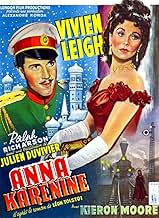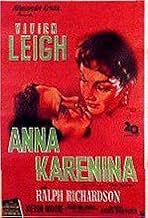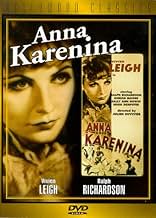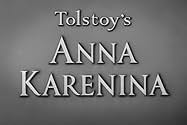VALUTAZIONE IMDb
6,6/10
3092
LA TUA VALUTAZIONE
Aggiungi una trama nella tua linguaA married woman's affair with a dashing young officer has tragic results.A married woman's affair with a dashing young officer has tragic results.A married woman's affair with a dashing young officer has tragic results.
- Regia
- Sceneggiatura
- Star
Niall MacGinnis
- Levin
- (as Niall Macginnis)
Recensioni in evidenza
Count Tolstoy's massive novels, "War and Peace," and "Anna Karenina" are personally quite challenging.
Here are breathtakingly crafted literary works in a spiritual context of unconstructive energy. It's quite easy to become as entranced within these "worlds" as are many music lovers within the skewed terrain of Wagner's Valhalla and Nibelungens.
Tolstoy's words pull in the reader almost hypnotically as he spins his titanic, subtle tales of societal mores conflicting with human emotions.
Many of his characters are self-absorbed and vain, and his social environments repressive and stolid, with false values that tragically dehumanize and destroy.
So it's an ultimate challenge to attempt to separate these energetic downers from their dazzling technical counterparts.
In the case of "Anna," after stripping away the polished veneer, I find characters trying to cope with their testy emotional choices while being thwarted by inhuman societal standards.
Yet "Anna" is a favorite of filmmakers, having been done countless times, with the Garbo-Selznick version the most notable. Here Vivien Leigh gives a creditable performance of this distraught heroine, with Director Julien Duvivier joining Jean Anuith in script adaptation.
Ralph Richardson and Kieron Moore are both completely substantial, and general production values are attended to with solid professionalism.
Alas, the enactment seldom tugs heartstrings and, in fact, a strangely turgid pall seems to hang over the entire production. Condensing a 900-page novel down to 2-hour running time doesn't help matters.
As for Leigh, my feeling is that she gravitated too often to "fallen woman" roles. While she portrayed them very well, they may have failed to bring her the uplift her personality seemed to desperately seek. Hers was pretty much a career of depressingly joyless female characters, which perhaps worked not to her personal advantage.
That's another matter, though; Leigh was forever the consummate, fine actress, and her legacy is one of great artistic achievement.
This version of "Anna Karenina" remains a thoughtful, worthy attempt at a near-impossible task.
Here are breathtakingly crafted literary works in a spiritual context of unconstructive energy. It's quite easy to become as entranced within these "worlds" as are many music lovers within the skewed terrain of Wagner's Valhalla and Nibelungens.
Tolstoy's words pull in the reader almost hypnotically as he spins his titanic, subtle tales of societal mores conflicting with human emotions.
Many of his characters are self-absorbed and vain, and his social environments repressive and stolid, with false values that tragically dehumanize and destroy.
So it's an ultimate challenge to attempt to separate these energetic downers from their dazzling technical counterparts.
In the case of "Anna," after stripping away the polished veneer, I find characters trying to cope with their testy emotional choices while being thwarted by inhuman societal standards.
Yet "Anna" is a favorite of filmmakers, having been done countless times, with the Garbo-Selznick version the most notable. Here Vivien Leigh gives a creditable performance of this distraught heroine, with Director Julien Duvivier joining Jean Anuith in script adaptation.
Ralph Richardson and Kieron Moore are both completely substantial, and general production values are attended to with solid professionalism.
Alas, the enactment seldom tugs heartstrings and, in fact, a strangely turgid pall seems to hang over the entire production. Condensing a 900-page novel down to 2-hour running time doesn't help matters.
As for Leigh, my feeling is that she gravitated too often to "fallen woman" roles. While she portrayed them very well, they may have failed to bring her the uplift her personality seemed to desperately seek. Hers was pretty much a career of depressingly joyless female characters, which perhaps worked not to her personal advantage.
That's another matter, though; Leigh was forever the consummate, fine actress, and her legacy is one of great artistic achievement.
This version of "Anna Karenina" remains a thoughtful, worthy attempt at a near-impossible task.
First off, let us concede that neither the 1935 Greta Garbo "Anna Karenina" nor the 1948 Vivian Leigh version comes close to capturing the complexities of Tolstoy's masterpiece. Most significantly, Konstantin Levin and Kitty's relationship, and more particularly, Levin's protracted personal and metaphysical development, are dropped entirely, both screenplays preferring to treat the story as an adulterous romantic triangle with snowflakes instead of palm trees.
That said, what we are left with in both films are masterpieces of film craftsmanship, where the triple triumphs of cinematography, art direction, and costume design are the real stars.
Which is not in any way to lessen the contributions of the cast, who in both instances, make the best of what they have to work with.
Garbo enchants in many of her individual scenes, particularly with Freddy Bartholomew and Maureen O'Sullivan, (as Kitty). Who can forget her advising Kitty to seize her fleeting youth, with its promise of a dream prince to emerge from the blue haze of the mountain top. Equally impressive, is her muted aversion to Alexei Karenin, (Basil Rathbone).
But she fails in her depiction of a fatal love for Count Vronsky (Frederic March). Garbo, with her solemn, majestic and singular self possession--her "Queen Christina" like cerebral detachment, is simply too thoughtful, too deliberate, to in any way convey Tolstoy's impulsive, febrile and thoughtless anti-heroine.
True, she had forsaken all for John Gilbert in "Christina," but that decision was the result of deep and thorough soul searching, and explained with the eloquence of Solomon to her courtiers. In "Camille" she is by profession a lover, and so her ultimate renunciation of Armand, reveals the true depth of her character. But one cannot conceive of her destroying the lives of others to satisfy a whimsical infatuation.
And this is where Miss Leigh's Anna trumps Garbo, for Miss Leigh does successfully transmit Anna's neurasthenic and utterly reckless collapse at the feet of the dashing Count. She seems blown by forces much stronger than she--a daffodil in a windstorm, and light years from Garbo's deep Scandanavian imperturbability.
Given the alleged similarities between Miss Leigh and Anna's disposition, perhaps this is life imitating art. In any case, it is why she makes a truer Anna, and why the role serves as a warm up for Blanche Dubois...
She is also abetted in her interpretation, by the genuinely eerie, recurring, nightmare sequence--with the Charon like, white bearded old man, forever dogging her as he chinks away at the ice. An ill omen indeed ! And Miss Leigh conveys the desperation of her impending doom in every gesture and nuance.
Then too Keiron Moore, (despite being an inferior actor to Frederic March) is much more dashing and handsome as Vronsky--a fact which, at least in terms of audience sympathy, helps explain the attraction.
Strangely, Mr. March who had been so visually appealing as Dr. Jeckyll, just a few years earlier, photographs very poorly in the Garbo version, and is not helped by a buzz haircut.
And as superb as Cedric Gibbons sets and Adrian's costumes are as a backdrop for Garbo, we feel Mr.Andrejew's art direction and Cecil Beaton's designs get the nod here as well, if only perhaps in their European origin, and the deep, appropriately moody nineteenth century shadows with which they are lit and photographed.
However, as visually sumptuous cinematic recreations of a vanished aristocratic world--each version has much to savor, and should be taken in tandem.
That said, what we are left with in both films are masterpieces of film craftsmanship, where the triple triumphs of cinematography, art direction, and costume design are the real stars.
Which is not in any way to lessen the contributions of the cast, who in both instances, make the best of what they have to work with.
Garbo enchants in many of her individual scenes, particularly with Freddy Bartholomew and Maureen O'Sullivan, (as Kitty). Who can forget her advising Kitty to seize her fleeting youth, with its promise of a dream prince to emerge from the blue haze of the mountain top. Equally impressive, is her muted aversion to Alexei Karenin, (Basil Rathbone).
But she fails in her depiction of a fatal love for Count Vronsky (Frederic March). Garbo, with her solemn, majestic and singular self possession--her "Queen Christina" like cerebral detachment, is simply too thoughtful, too deliberate, to in any way convey Tolstoy's impulsive, febrile and thoughtless anti-heroine.
True, she had forsaken all for John Gilbert in "Christina," but that decision was the result of deep and thorough soul searching, and explained with the eloquence of Solomon to her courtiers. In "Camille" she is by profession a lover, and so her ultimate renunciation of Armand, reveals the true depth of her character. But one cannot conceive of her destroying the lives of others to satisfy a whimsical infatuation.
And this is where Miss Leigh's Anna trumps Garbo, for Miss Leigh does successfully transmit Anna's neurasthenic and utterly reckless collapse at the feet of the dashing Count. She seems blown by forces much stronger than she--a daffodil in a windstorm, and light years from Garbo's deep Scandanavian imperturbability.
Given the alleged similarities between Miss Leigh and Anna's disposition, perhaps this is life imitating art. In any case, it is why she makes a truer Anna, and why the role serves as a warm up for Blanche Dubois...
She is also abetted in her interpretation, by the genuinely eerie, recurring, nightmare sequence--with the Charon like, white bearded old man, forever dogging her as he chinks away at the ice. An ill omen indeed ! And Miss Leigh conveys the desperation of her impending doom in every gesture and nuance.
Then too Keiron Moore, (despite being an inferior actor to Frederic March) is much more dashing and handsome as Vronsky--a fact which, at least in terms of audience sympathy, helps explain the attraction.
Strangely, Mr. March who had been so visually appealing as Dr. Jeckyll, just a few years earlier, photographs very poorly in the Garbo version, and is not helped by a buzz haircut.
And as superb as Cedric Gibbons sets and Adrian's costumes are as a backdrop for Garbo, we feel Mr.Andrejew's art direction and Cecil Beaton's designs get the nod here as well, if only perhaps in their European origin, and the deep, appropriately moody nineteenth century shadows with which they are lit and photographed.
However, as visually sumptuous cinematic recreations of a vanished aristocratic world--each version has much to savor, and should be taken in tandem.
I've now watched 6 Anna Kareninas (1935, 1947, 1961, 1985, 1997 and 2012) and this is up there as one of the top ones. Vivien Leigh is perfectly cast as Anna Karenina. There's just something about Leigh that suggests strength but also fragility, primness but also sensuality. She is totally believable as a sensible woman who would go silly over an affair, and believable as a fertile motherly type, frequently surrounded by children.
The object of the affair is the film's weak link- and it's a big one. Keiron Moore as the dashing Count Vronsky seems about as worldly as Anna's little son Sergei. You can sense Vivien Leigh trying to coax him into displaying some sort of dominant passion but Moore is hopelessly lost. His natural accent is Irish I think; his English accent sounds hopelessly strangled.
Ralph Richardson as Anna's bureaucratic husband Karenin is a bit too strong. He has the dominance that Vronsky should have and he displays his love for Anna too clearly. Anna is partly driven to her affair by Karenin's coldness so it makes the affair less credible. Their relationship is too loving- it often seems that there will be a reconciliation, as Leigh clearly has more chemistry with him than Moore.
Onto the supporting actors now. The Kitty/Levin story, although very pared down, is sweet and touching. Yes, they miss out all of Levin's philosophy and farming, but Sally Ann Howes is adorable as Princess Kitty, who gentleman farmer Levin hopelessly loves. It is also neatly tied together with the Anna story when Karenin goes along to their wedding- without Anna.
The film might seem a little dated but I enjoyed the focus on Karenin. There's a comic scene where Karenin goes along to a solicitors to ask about divorce and the solicitor seems a little voyeuristic. Where do I place it in the six AK films? I'm tempted to put it at number 2, just behind the Garbo one.
The object of the affair is the film's weak link- and it's a big one. Keiron Moore as the dashing Count Vronsky seems about as worldly as Anna's little son Sergei. You can sense Vivien Leigh trying to coax him into displaying some sort of dominant passion but Moore is hopelessly lost. His natural accent is Irish I think; his English accent sounds hopelessly strangled.
Ralph Richardson as Anna's bureaucratic husband Karenin is a bit too strong. He has the dominance that Vronsky should have and he displays his love for Anna too clearly. Anna is partly driven to her affair by Karenin's coldness so it makes the affair less credible. Their relationship is too loving- it often seems that there will be a reconciliation, as Leigh clearly has more chemistry with him than Moore.
Onto the supporting actors now. The Kitty/Levin story, although very pared down, is sweet and touching. Yes, they miss out all of Levin's philosophy and farming, but Sally Ann Howes is adorable as Princess Kitty, who gentleman farmer Levin hopelessly loves. It is also neatly tied together with the Anna story when Karenin goes along to their wedding- without Anna.
The film might seem a little dated but I enjoyed the focus on Karenin. There's a comic scene where Karenin goes along to a solicitors to ask about divorce and the solicitor seems a little voyeuristic. Where do I place it in the six AK films? I'm tempted to put it at number 2, just behind the Garbo one.
When Vivien Leigh did her version of Anna Karenina for the British cinema she had the advantage of a less stringent censorship in the UK than Greta Garbo had working for MGM in the Thirties. Garbo was hemmed in by restrictions that she had to be a wronged woman, seduced and abandoned by her lover, and committing suicide to also atone for her sins.
Vivien plays a woman who knows precisely what she was doing and yet she chose to flout the male dominated society of 19th Century Russia. Like Garbo she is married to a pill of a husband and when a dashing young cavalry officer shows his attentions to her, she falls madly in love.
It's pointed out to her at least once in the film that her biggest sin is a lack of discretion. But Vivien and Kieron Moore want the whole world to know what's going on with them. Like William Randolph Hearst and Marion Davies.
MGM softened the portrait of Count Vronsky in the Garbo version by making it an eagerness to get back into the military during war that causes the breakup. Here Kieron Moore is far less noble. Not a bad person but a weak one. His mother wants him to make a more advantageous marriage and not to a woman with a bad reputation even though he's the one who gave her the bad reputation.
There's also a cop out scene filmed by MGM where Vronsky played by Fredric March expresses remorse over Anna in the end. No such scene exists in this more realistic version.
Of course Ralph Richardson as the husband Karenin is just as big a pill as Basil Rathbone was back in 1935. A man quite full of himself in his high level job in the Czar's government, he only sees how Anna's betrayal is affecting him. Richardson is almost doing a dress rehearsal for his portrayal of Dr. Sloper in next year's The Heiress.
Vivien Leigh was unfairly compared to Greta Garbo back when this came out, unfairly I think because there's only one Garbo. Vivien was a frail creature in life and that helped in a lot of her work. Anna was a frail creature herself unable to stand up to the hypocrisy and the pressure of the society around her.
In fact Anna Karenina is a story of failure. Two people fall in love, one of them trapped in a loveless marriage, and attempt to flout society and they lose. Tolstoy sees all that and records it well, but offers no solution.
Women's liberation was off the radar in old mother Russia.
Vivien plays a woman who knows precisely what she was doing and yet she chose to flout the male dominated society of 19th Century Russia. Like Garbo she is married to a pill of a husband and when a dashing young cavalry officer shows his attentions to her, she falls madly in love.
It's pointed out to her at least once in the film that her biggest sin is a lack of discretion. But Vivien and Kieron Moore want the whole world to know what's going on with them. Like William Randolph Hearst and Marion Davies.
MGM softened the portrait of Count Vronsky in the Garbo version by making it an eagerness to get back into the military during war that causes the breakup. Here Kieron Moore is far less noble. Not a bad person but a weak one. His mother wants him to make a more advantageous marriage and not to a woman with a bad reputation even though he's the one who gave her the bad reputation.
There's also a cop out scene filmed by MGM where Vronsky played by Fredric March expresses remorse over Anna in the end. No such scene exists in this more realistic version.
Of course Ralph Richardson as the husband Karenin is just as big a pill as Basil Rathbone was back in 1935. A man quite full of himself in his high level job in the Czar's government, he only sees how Anna's betrayal is affecting him. Richardson is almost doing a dress rehearsal for his portrayal of Dr. Sloper in next year's The Heiress.
Vivien Leigh was unfairly compared to Greta Garbo back when this came out, unfairly I think because there's only one Garbo. Vivien was a frail creature in life and that helped in a lot of her work. Anna was a frail creature herself unable to stand up to the hypocrisy and the pressure of the society around her.
In fact Anna Karenina is a story of failure. Two people fall in love, one of them trapped in a loveless marriage, and attempt to flout society and they lose. Tolstoy sees all that and records it well, but offers no solution.
Women's liberation was off the radar in old mother Russia.
How can one possibly turn Tolstoy's novel into a "short" film? Even at 139 minutes in the uncut Korda version so much must be lost. What we end up, sad to say, is a first-rate melodrama without the psychological subtleties of the book. But that's the bad news. On the plus side, we have the sort of lavish the sky's-the-limit big, big, bigger budget production that only the Hungarian Alex Korda could have produced a few years after the world war on the sound stages of London --sets by the Russian Andreiev, costumes by the English Cecil Beaton; deep-focus photography and lighting by the French Henri Alekan ("Belle et Bete"), and music by the English composer Constant Lambert. Technically, this film contains some of the best B&W work ever done in Britian. Perhaps the greatest fault of the film is in the style of the acting. Vivian Leigh is a great beauty, very aristocratic, very British in her reserve, but when she falls in love with Vronsky she seems constitutionally incapable of the unbridled passion that Garbo brings to the role. Ralph Richardson, however, is perfect --far superior to Basil Rathbone. Richardson displays all the rigidity of Anna's husband; his enormous pride and wounded vanity; his total incapacity to understand his wife's heart. Needless to say, Kieron Moore as Vronsky tries very hard, looks wonderful in costumes, but he seems more a West-End juvenile than the great aristocrat and officer that Tolstoy depicts. Laurence Olivier would have been a perfect Vronsky. Why Korda chose not to cast him beside his wife is a mystery.
Lo sapevi?
- QuizVivien Leigh's costumes were made in Paris by Barbara Karinska to Cecil Beaton's designs. She was in such pain wearing them that she even went to her doctor fearing she had broken her ribs. It was subsequently discovered that the dresser had been putting the corsets on upside down.
- Citazioni
Anna Karenina: My dear Korsunsky, you know very well I never dance unless I can help it.
- Curiosità sui creditiClosing credits: "And the light by which she had been reading the book of life, blazed up suddenly, illuminating those pages that had been dark, then flickered, grew dim, and went out forever".
- Versioni alternativeU.S. release version runs approximately 112 minutes. This is the version issued by Fox DVD in 2007.
- ConnessioniFeatured in Vivien Leigh: Scarlett and Beyond (1990)
I più visti
Accedi per valutare e creare un elenco di titoli salvati per ottenere consigli personalizzati
Dettagli
- Data di uscita
- Paese di origine
- Sito ufficiale
- Lingue
- Celebre anche come
- Alexander Korda's Production of Tolstoy's Anna Karenina
- Luoghi delle riprese
- Monterey, California, Stati Uniti(racetrack and steeplechase scenes)
- Azienda produttrice
- Vedi altri crediti dell’azienda su IMDbPro
Botteghino
- Budget
- 2.000.000 USD (previsto)
- Tempo di esecuzione2 ore 19 minuti
- Colore
- Proporzioni
- 1.37 : 1
Contribuisci a questa pagina
Suggerisci una modifica o aggiungi i contenuti mancanti

Divario superiore
By what name was Anna Karenina (1948) officially released in India in English?
Rispondi


































